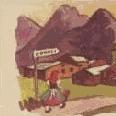A Most Wanted Man is John LeCarré at his most wicked.
LeCarré is weaving a historic storytelling tapestry of Bayeux dimensions.
Except there are no heroes. None at all. No Halley's comet either. It's dark horses at every turn..
The book weaves, embroiders and intertwines shards of plots we're all too familiar with.
What's new for me personally is that the outcome does not interest me at all.
Yet I keep on reading, riveted to the book page by page.
The work is non-putdownable.
For LeCarré is enfolding a panoramic vision of our time and how both, the ordinary and the courageous individual will interact in it. How the everyday quality of everything has been altered irrevocably by the banality of the fact that anything, anyone, anywhere is bound to become an object of secret service scrutiny, then perhaps, further down the line, a guilt-ridden participant in the game of intelligence gathering and even worse, an unwitting agent provocateur exploiting his or her familiar surroundings. Guided of course by well-meaning, gravely well-meaning, experts of the game.
Previously, spy scenarios were the thrilling exception to the backdrop of orderly, ordinary life of the cold war era. But now they have become the banal, universal, omnipresent occurrence of the post cold war life. No one, but really no one, is except from the danger of being sucked into spying on one's neighbours. We are all subject to this current day fallout. No shelter either.
The German title then sums it up and spoils the real plot, which is meant to gradually show to us “how it is now, and what we have become” without explicitly saying it - - we've all become puppets - - Marionetten.
Translating this book full of British vernacular sayings - - what an interesting challenge.
Moreover – this is an observation of German officialdom from the outside, by a foreigner.
Just as Lecarré had deconstructed with ever so gentle brush strokes such legends as British Upper Class Fairplay, Foreign Service Righteousness and Benign Corporate Power in his work The Constant Gardener, he is at it again. This time, making seemingly innocuous observations of bits and pieces of behaviour that characterize the conduct of clandestine public servants in Germany as well as around the world... Never ever does he allow himself cheap shots. No crude stereotyping of German authoritarianism there.
It's more a case of unsuppressed sensibility and awareness. That in itself creates its own anarchy and irreverence without aiming to do so.
So what's the short of it? If Kerouac announced the era of On The Road, LeCarré unveils the era of On The Radar, and discusses the moral imperative of behaving ethically, even if one is completely under control and under duress. The ubiquitousness of being spied on, lied to and threatened by the - once civilized - state in the course of the constant War On Terror. The utter futility of acting ethically and yet having to try. The utter preprogrammed failure and danger of wanting to behave like a decent human being.The tragedy of it. The knowingness of it. The bearing it. The wound that does not heal. The sadness, the sense of loss, that just ... is. That we all share, eventually.
If the Atomic bomb sent Kerouac on the road, living in the moment, the bugged and buggered lives we live now, release us into a nothingness borne with Chaplinesque dignity. That is the short of it. My spoiler.
Heidi 2.0 muses
Reporter to Gandhi, What do you think of Western Civilization?
Gandhi to reporter, ever the optimist, It will be a good idea!
Mittwoch, 6. Mai 2009
Abonnieren
Kommentare zum Post (Atom)


Keine Kommentare:
Kommentar veröffentlichen